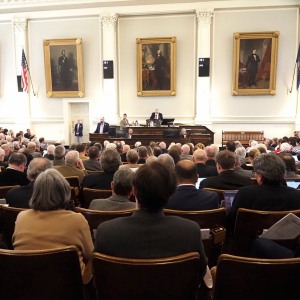Editorial: OneCare’s aversion to transparency
|
Published: 11-22-2024 10:00 PM
Modified: 11-25-2024 10:40 AM |
Whatever else it was, or is, OneCare Vermont, the state’s only Accountable Care Organization, hasn’t been especially accountable. This is not to mention that its operations have been largely opaque — if not wholly unknown — to average Vermonters, whose health care it was intended to revolutionize.
OneCare announced earlier this month that it will be winding down operations and close up shop by the end of next year, after nearly a decade of “successful collaboration among healthcare providers to improve quality and reduce spending.” Vermont health care providers have realized “millions in shared savings” and achieved enhanced quality of care, according to the announcement.
Maybe so. But that the effort was not a game-changer is obvious. The state’s health care system is crisis, with many hospitals and other providers struggling to stay afloat financially, insurance rates skyrocketing and patient access problematic in many areas.
Just last week, the University of Vermont Health Network, of which OneCare is an affiliate, announced significant retrenchments that included closing two clinics and an inpatient psychiatric unit and reducing by 50 the inpatient census at its flagship hospital in Burlington. And Gifford Health Care, based in Randolph, abruptly shut down chiropractic and urogynecology services Nov. 7.
Save for one independent federal study focusing on Medicare patients during the 2018-2021 period, we know of no hard evidence that OneCare improved access to or quality of health care for the 200,000 Vermonters and 5,000 providers it covered, or contained spending in any meaningful way, despite having burned through millions in cash. State Auditor Douglas Hoffer and regulators at the Green Mountain Care Board have reached pretty much the same conclusion.
OneCare describes itself as a “private 501(c)(3) organization, funded by its private nonprofit hospital members, with the charitable purpose of improving healthcare outcomes for Vermont residents while stabilizing healthcare costs.”
The creation of Accountable Care Organizations was authorized under the Affordable Care Act, aka ObamaCare, with the idea that offering health care providers financial incentives to keep patients healthy instead of reimbursing them for every individual procedure performed would hold down spending because fewer patients would need expensive in-patient hospital care or emergency room visits. That is, patients would have access to the primary care and related support needed to avoid getting critically ill.
Under OneCare’s so-called all-payer system, it contracts with the federal Medicare program, the federal-state Medicaid program and private insurers to bundle payments and incentives to participating hospitals and other health care providers in the form of regular monthly lump sums.
Article continues after...
Yesterday's Most Read Articles
 On anniversary of mass arrests, pro-Palestinian protesters erect tents in front of Dartmouth administration building
On anniversary of mass arrests, pro-Palestinian protesters erect tents in front of Dartmouth administration building
 Hartford eliminates curbside recycling program
Hartford eliminates curbside recycling program
 Upper Valley nonprofit organization plant sales 2025
Upper Valley nonprofit organization plant sales 2025
 Majority of Bradford, Vt. firefighters resign to protest Selectboard’s management
Majority of Bradford, Vt. firefighters resign to protest Selectboard’s management
For an Accountable Care Organization, OneCare seemed to be allergic to the kind of oversight that ensures accountability. For example, it appealed to the Vermont Supreme Court, and failed, to block two directives from regulators at the Green Mountain Care Board. One was that it obtain from member hospitals affidavits certifying that incentive payments made to hospitals to support primary care were actually being used for that purpose. This after OneCare testified to the board that — almost unbelievably — it did not track such payments and could not do so unless it asked for specific reports from member hospitals, which it had not done.
The second directive capped aggregate executive compensation at the organization. This budgetary cap was imposed after the Green Mountain Care Board found that total compensation for OneCare executives at the vice president level and above spiked 62% between the 2021 fiscal year and the proposed budget for fiscal year 2023, while its performance results “compared unfavorably to national comparison groups” on ACO metrics and the “total cost of care per beneficiary had increased both in absolute and relative terms.” The state Supreme Court affirmed this summer that the Care Board had the statutory authority to impose those budgetary conditions.
That OneCare’s goals were not being achieved can also be inferred from the fact that Dartmouth Health, an original partner in the venture, pulled back from its governance role in 2021 and Blue Cross-Blue Shield of Vermont ended its affiliation in December 2022 “because of a lack of tangible quality outcomes and inability to reduce costs.”)
It must be acknowledged that OneCare was an experiment undertaken without much of a road map as to how to accomplish its goals. But the experience does raise the question of whether the holy grail of health care reform — ending fee for service reimbursements and instead paying providers to keep people healthy — is a chimera. Vermont is expected to transition in 2026 to a new federal multi-state payment reform project. Perhaps a larger scale operation will be better able to meet the goals of health care reform. We certainly hope so.






 Editorial: Dartmouth should join the fight
Editorial: Dartmouth should join the fight Editorial: Vermont judge defends free speech
Editorial: Vermont judge defends free speech  Editorial: Free speech detentions reach into Upper Valley
Editorial: Free speech detentions reach into Upper Valley Editorial: New Hampshire budget shortfall is a crisis of Republican design
Editorial: New Hampshire budget shortfall is a crisis of Republican design
